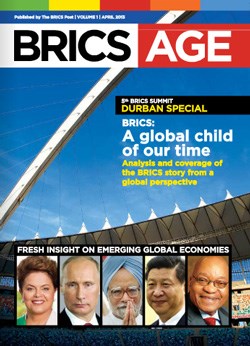The London-based BRICS Media Network, established in 2012 to bring fresh perspectives to coverage of the emerging new economic world order, has launched BRICS Age, a print magazine commemorating the historic 5th BRICS Summit in Durban, South Africa.
The BRICS Age magazine builds a platform to unravel the intricacies and complexities of information flow from these countries. We believe that there is a lot which needs to be understood better and there is a lot which needs to be told better.
Zeenat Saberin, BRICS Age editor says: "We are witnessing interesting times; BRICS is a great developing story to tell. Most observers reflect that the world economy is experiencing a marked shift. Our narrative is focusing on "where it is shifting to".
The BRICS Media Network also publishes an online newspaper called The BRICS Post.
"We're talking about the combined economic dynamo of some of the world's fastest growing markets," says BRICS post contributing editor, Firas Al-Atraqchi.
"This massive growth engine that spans four continents and three billion people produces a business conversation that cannot be ignored. With our growing cadre of analysts and experts, we monitor and cover that conversation for our global audience," he added.
Top contributors
The BRICS Age magazine features 12 articles from leading economy writers and global analysts.
For example, Hu Shuli, editor-in-chief of Caixin Media, claimed to be China's most authoritative business publication, cautions in her exhaustive article that Beijing shouldn't conclude too quickly that it is rising to the top.
"Looking forward China must learn from its own neighbours and its own mistakes. It must not inflate its ego with dreams of past glory."
Fyodor Lukyanov, chairman of the council on Russia's Foreign and Defence Policy, points out that apart from BRICS there is no other such representative format in the world that could serve as a platform for working out truly global approaches to international problems.
South Africa's foreign minister, Maite Nkoana-Mashabane explains in another article that economic power is shifting with emerging economies leading the global growth. Many people she meets wonder what comes after the Durban summit. The only way is forward she argues.
World Bank woes
Writing about the BRICS' development bank, Oliver Stuenkel, assistant professor of International Relations at the Getulio Vargas Foundation in São Paulo in Brazil, argues that while emerging powers seek a larger role in the existing framework, they do not feel that established powers are willing to provide them with adequate power and responsibility.
The World Bank, despite its name, he writes, remains a Western-dominated institution in the eyes of the emerging powers.
Neil MacKinnon, global macro strategist at VTB Capital, explains that faster growth rates in China and India imply that their combined GDP will exceed G7 economies by 2025.
India should be the third global economic giant by 2050 with Brazil in fourth place. Russia he says would overtake Germany to become the largest European economy by 2020.
You can access the magazine online at www.bricsage.com.



















































